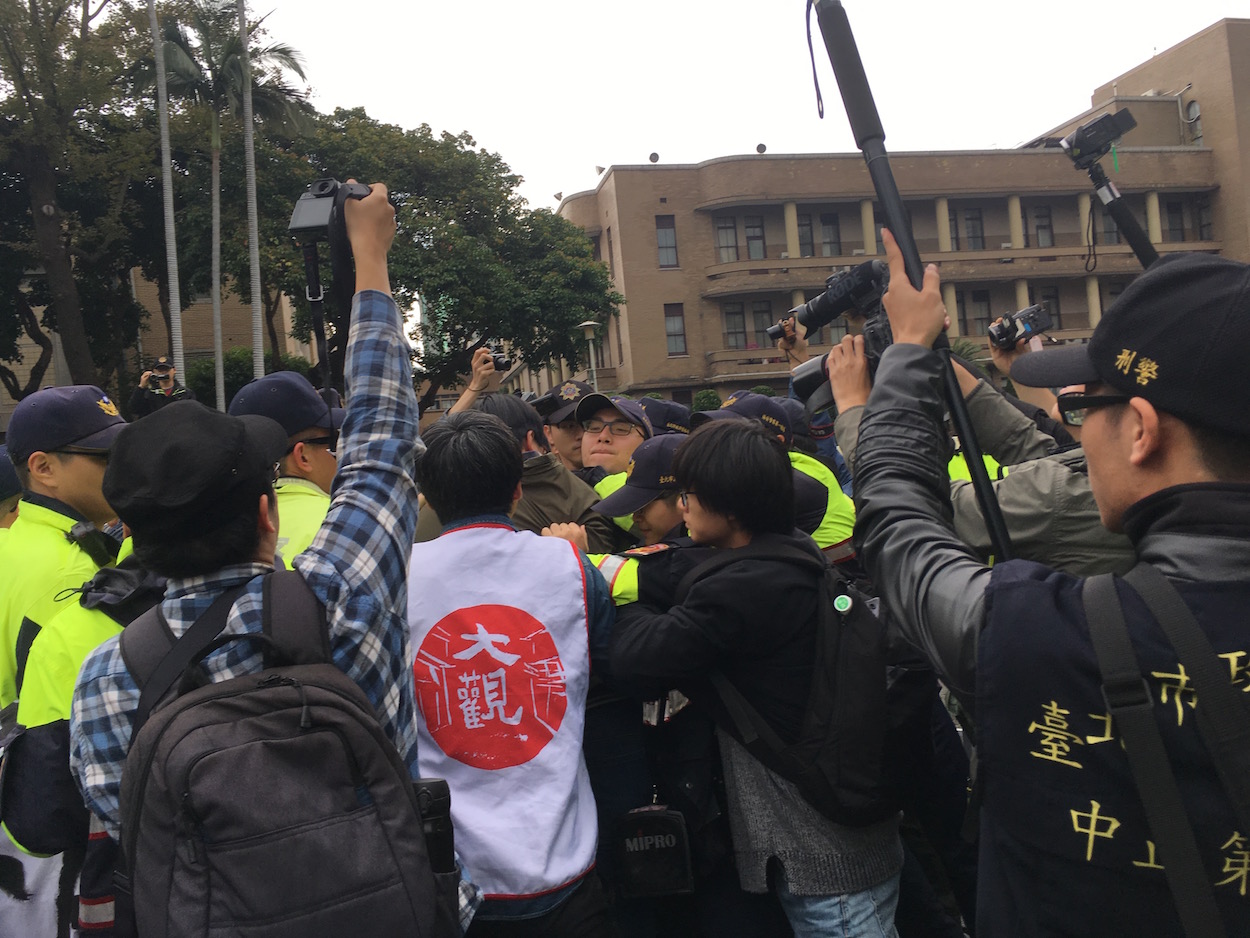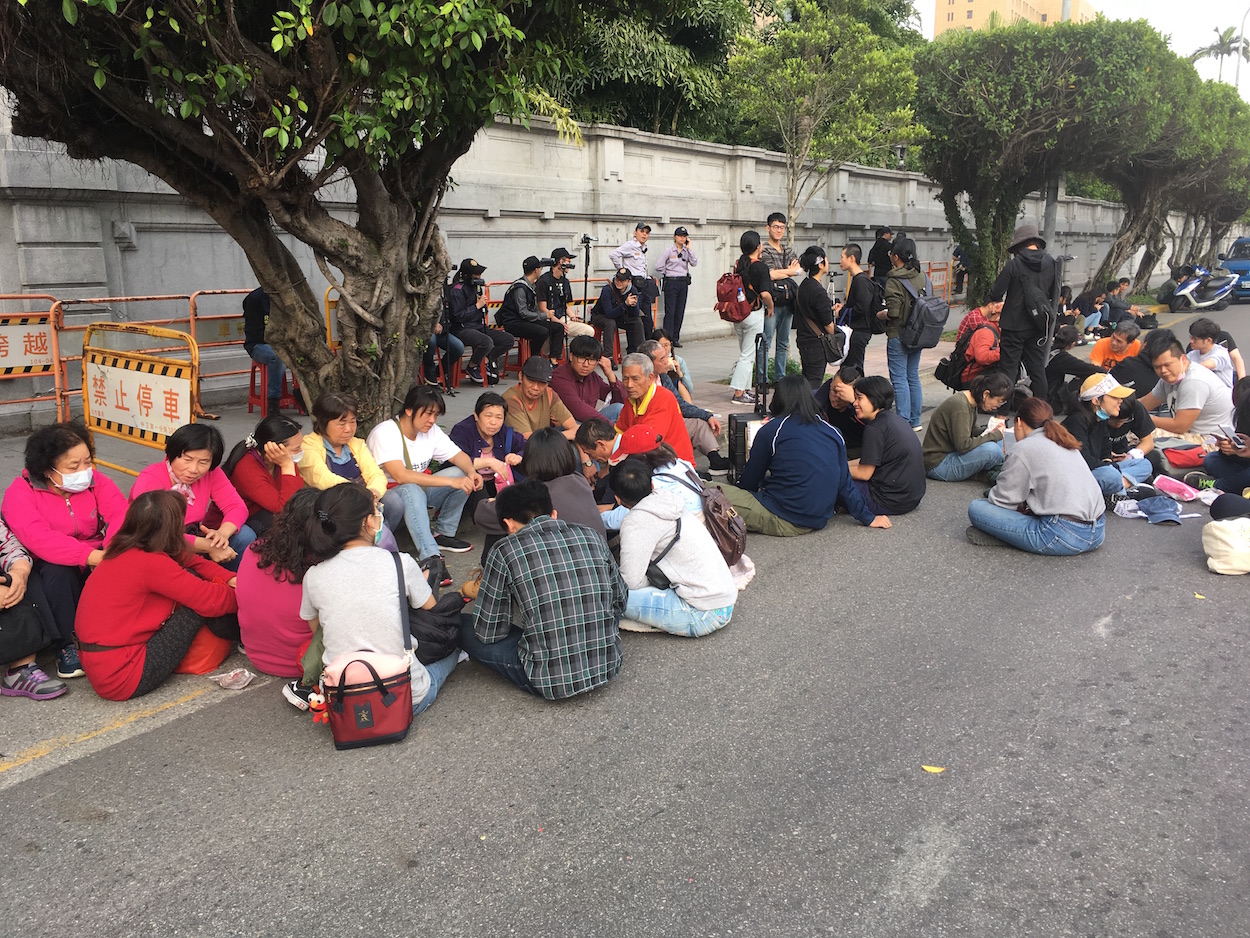by Brian Hioe
語言:
English /// 中文
Photo Credit: Brian Hioe
THE SCHEDULED demolition of Daguan Community, a military dependents’ village, was temporarily called to a halt last week following negotiations between Daguan Community residents and government officials.
 Clashes between protesters and police outside the Executive Yuan on March 6th. Photo credit: Brian Hioe
Clashes between protesters and police outside the Executive Yuan on March 6th. Photo credit: Brian Hioe
Daguan Community is a military dependents’ village in New Taipei that was originally slated for demolitions on March 18th. The New Taipei city government gave residents notice to vacate their homes on March 4th, leaving residents with less than two weeks to find new residences.
However, Daguan residents have been facing the threat of eviction for over two years, with New Taipei city government officials claiming that Daguan residents are illegally occupying their land and are not the original residents of the military dependents’ village. Military dependents’ villages are a form of housing community that military veterans that came with the KMT to Taiwan with their families were settled in, but many military dependents’ villages are built of ramshackle structures, with many impoverished, elderly, or infirm residents. In the present, the residents of military dependents’ villages may face eviction from developers working with city governments that wish to redevelop the land.
For their part, Daguan residents state that they paid for their homes when the community was settled or purchased their homes from the original residents and that, either way, they have been living on the land for four or five decades. Residents emphasize that they would not be able to find new homes, and are already too poor to purchase new housing or even afford a move. After having lived for decades in Daguan, they may be too elderly and infirm to be able to adjust to a new environment, and so relocation for Daguan residents could be a literal death sentence.
 Injured protester on March 6th. Photo credit: Brian Hioe
Injured protester on March 6th. Photo credit: Brian Hioe
In their demonstrations, Daguan residents have been aided by a number of youth activists, primarily based out of National Taiwan University. Protests in the last month were heated, with clashes breaking out between Daguan residents and supportive student activists with police in front of the Executive Yuan on the morning of March 6th. A protest on March 11th at the Veterans Affairs Council, which should be responsible for veteran’s benefits and welfare, involved spray painting the inside of the building with slogans such as “Oppose Eviction,” “Stop the Cranes,” and “Protect Daguan”.
After the ensuing confrontation between police and demonstrators, twenty demonstrators were dragged off in police buses. The majority of those arrested were students. One student demonstrator became ill during the protest and was sent to the emergency room. Police followed the student to the hospital and took her away for questioning once she had recovered, refusing to allow police to take pictures of her in the hospital despite her being willing to be photographed. Police then detained arrested students for over twelve hours, with Daguan residents gathering outside the Taipei District Prosecutor’s Court to wait until they were released.
A subsequent protest on the morning of March 14th drew several hundred, marching from the Veterans’ Affair Council building to the Presidential Residence, where a sit-in was held on Ketagalan Boulevard. A marathon 9-hour negotiation session between residents and authorities also took place that day, resulting in a deal in which the demolition was temporarily halted in return for residents agreeing to hand over their homes. Residents will have to pay the cost of demolition for their homes but may be provided with resettlement fees around 100,000 NT to lower-income families in the community.
 Sit-in on Ketagalan Boulevard on March 14th. Photo credit: Brian Hioe
Sit-in on Ketagalan Boulevard on March 14th. Photo credit: Brian Hioe
On the other hand, Daguan residents question whether the definition of “lower income family” will, in fact, be exclusionary of the majority of residents. Residents have been critical of what they view as the failure of the government to provide a resettlement plan for Daguan residents, as promised, and its reluctance to provide 100,000 NT resettlement fees to residents. But Daguan residents have already agreed to their homes being demolished.
Consequently, it remains possible that Daguan residents will continue to organize protests, in order to fight for their rights in what is still a time of crisis. Similarly, the original settlement plan stipulated that all 21 households in Daguan community would agree to give up their homes, but that if any resident decided to renege on this promise this would mean the immediate demolition of the community as a whole. As such, it is also not impossible that events in subsequent days and weeks will still lead to the demolition of the Daguan community.

